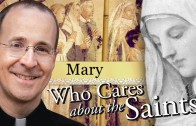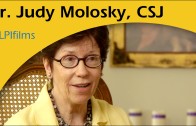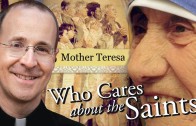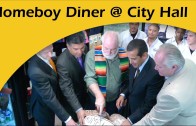BVM, OMG!
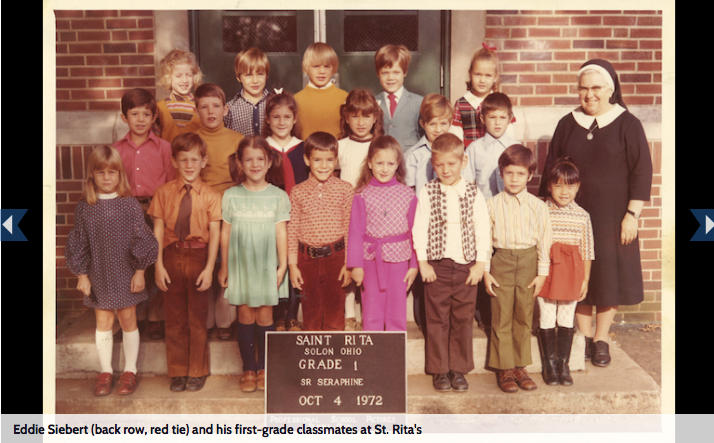
Written by Fr. Eddie Siebert, SJ
In elementary school at St. Rita’s in Solon, Ohio, I always looked forward to the May Crowning of the Blessed Virgin Mary (BVM for short). Sure, a lot of that excitement probably had to do with getting outside in the middle of a school day after a long Ohio winter. But there were other perks, too. Decorated with Mary pins and medals complete with blue ribbons (to match the BVM, of course), my classmates and I were each charged with specific responsibilities we took quite seriously. Some students carried felt Marian banners. (It was the ’70s and felt was very much in.) Others carried flowers while the remaining, no less important group piously held their hands in prayer. My job — which I was particularly proud of — was to carry Sister Ann Louise’s music book so she could play the St. Louis Jesuits hymns on her autoharp. (Did I mention it was the ’70s?)
Clutching our plastic rosaries, we’d process two by two from our classroom, surrounding the much-envied 8th-grader who had the honor of carrying the Mary statue. Mary resided adjacent to the school cloakroom for most of the year, but each May, the nuns dusted and polished her for the occasion. The yearly makeover brought out such an undeniable majesty that all who viewed her overlooked the aged statue’s chipped edges.
Each year, the sisters would spend ample time successfully getting us excited about Mary, the crowning procession, and explaining why we should pray to her. But those nuns were also pragmatic and let it be known that hard candy would be given after the procession to well-behaved students. So with a focus rare among elementary school children, we’d process through our campus and into the neighborhood, singing and praying to the BVM like pros, the whole rite dramatically culminating when one lucky student crowned her with flowers in the gleam of the spring sun. I never had this particular honor, but then again, it didn’t really bother me — I knew my role helping Sister was more than significant.
I remember gazing at the statue in its temporary spot next to St. Rita’s playground with its rusty monkey bars. I felt something like awe observing her, clad in classic blue with a porcelain-like face. She was like a superhero to us — a real queen of heaven — ready to intercede at any time. This queen, the statue suggested, had no trouble stomping on pesky snakes and looking serene while doing so. Surely, there was no challenge she couldn’t handle. Like a lot of children, this thought of Mary gave me comfort.
As I grew older, Mary became less of a porcelain otherworldly queen and more like someone I could relate to: a human being with vulnerabilities and difficult decisions to make. Today, my mind turns to a 14- or 15-year-old uneducated, pregnant girl from a small, poor town. A girl whose betrothed isn’t exactly the father of her expected child. How many of us would recognize a girl like this as God’s choice to bring His son into the world, a future queen of heaven?
The image of Mary’s far-from-porcelain life has deepened my devotion to her. In some ways, the statuesque “Mary superhero” lets us off the hook, doesn’t it? Someone that perfect could never understand the messiness of a human existence like mine. I mean, she doesn’t even flinch while stomping on those snakes! Maybe following God’s will is best left to perfect people like that — you know, the serene, otherworldly types. But it’s the full reality of Mary — a vulnerable human who struggled with fears, doubts, and day-to-day human life just like me — that challenges me to say yes to God even when I’d prefer to say no.
Shortly after his book My Life with the Saints was published, I was on a retreat with my friend Jim Martin. I suggested we put together some short videos about each of the saints he’d written about. The result is aptly titled “Who Cares About the Saints?” I think this segment on Mary is helpful for us all as we reflect on the Feast of the Assumption and gives ample reason as to why we should care. Give it a look, and check out below, “Three Reasons You Should Care About the BVM”
1) Mary was not born a queen. She was a young girl from a poor, “backwater” town. She most likely was illiterate, and she was pregnant and unmarried. And yet, God chose her. We learn from Mary that it doesn’t matter where you come from: your life has immense purpose. God has a habit of choosing unknown people to do remarkable things.
2) Mary said yes when she could have said no. When the angel Gabriel came to Mary with God’s invitation, she had to make a decision. Mary had free will, like all of us. She was presented with a path that would utterly change her life. Like us, she asked, “How can this be?” I don’t know about you, but change isn’t my strong suit, nor is the unknown (my day practically topples when my morning routine alters). Despite being faced with a lot more scary unknowns, Mary decided to say yes and trust God. How often do we do that?
3) “Then the angel left her.” To make matters even tougher, after Mary says yes, the angel departs! Do you think those next days, months and years were particularly easy for the BVM? We all have glimpses or experiences of God’s love (a moment in prayer, a relationship mended in our life, the experience of giving or receiving love freely), but it’s not a permanent feeling. So often we catch a glimpse and then feel alone and lost. It was Mary’s faith that got her through raising Jesus (if we believe in the incarnation, we have to accept that he once was a moody hormonal teen, too), becoming his first disciple and “understanding Jesus’ role better than he did” and inevitably losing him in death. What sustains us when we don’t feel God’s presence and we have no road map?
Mary’s story was first told to me by the nuns at St. Rita’s — forward-thinking women who had a knack for explaining complicated theology in tangible ways to children (and smartly tying in hard candy rewards). That story planted by those nurturing sisters continues to deepen and evolve and serve as a source of strength for me. It’s a reminder that a yes to God doesn’t guarantee a perfect existence — far from it. But with that yes, and that trust, comes something beyond wonderful that is available to everyone, regardless of who you are, or where you come from.
Syndicated from http://ncronline.org/blogs/ncr-today/bvm-omg
